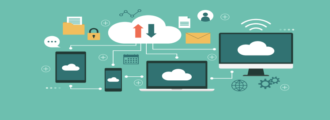The process of researching, purchasing, and implementing an enterprise resource planning (ERP) system can be complicated. And, there’s no such thing as a one size fits all ERP.
Most solutions have a wide variety of features, functionality, and other components to help you manage core business processes and achieve operational efficiency.
Components of ERP systems include front and back-office functions like finances, human resources, supply chain management, project management, customer relationship management (CRM), and more. So how do you start your search for the right ERP system for your business? We have you covered.
This article explains each ERP component and the benefits it can bring to an organization. But before diving into the components, let’s define what an ERP module is.
What is an Enterprise Resource Planning Module?
Enterprise resource planning software is an integrated system that ties together various business processes through a central database. A complete ERP solution comprises different applications or modules with unique functionality to address a specific business process. For example, you can have ERP modules for accounting, inventory management, human resources, supply chain management, etc.
The different modules within an ERP solution provide business departments with software built for their specific needs. With all the modules connected within the same platform, it enables the flow of data between them, giving your company a single source of accurate, real-time data. This allows your company to improve operations and gives your team actionable insights related to the business.
ERP modules also allow you to create a customized ERP solution tailored to your business needs. If you’re a manufacturing company, you’ll find modules built for your business needs, like product and order management. The same goes for almost every other industry. ERP systems offer the flexibility to create a solution that can improve every aspect of your operations.
Take a deeper dive into manufacturing ERP solutions in our article, An Introduction to Manufacturing ERP Software.
Main ERP Components
Modern ERP systems can be customized for every business sector. But there are six main components that are applicable to every business. Let’s look in detail at each of those main components.
Financial Management
Every business process involves money—or at least that’s the goal. Financial management involves everything from paying employees and vendors to paying taxes.
The financial management component deals with all of those business-critical transactions and financial data like accounts receivable, accounts payable, budgeting, forecasting, cash flow, etc. It can also analyze trends in spending to help reduce costs, increase profits, and uncover actionable insights into opportunities.
This component is vital because your other business data feeds into this module. Doing so eliminates a lot of manual tasks from your finance team and gives them access to real-time financial data. By automating these processes, you free your team up to focus on more meaningful work that helps improve your bottom line.
Customer Relationship Management
The customer relationship management (CRM) component of ERP software collects—you guessed it—customer data. Customers are the most important part of a business. They drive revenue, and without them, a company couldn’t exist. That’s why this component is one of the most vital pieces of an ERP system.
This module tracks all customer data, including personal data (like name, email, address, etc.), customer buying habits, purchases, wish lists, and more. This helps companies personalize the buying experience and provide better customer support.
Customer data analysis can be done through this module which allows you to track buying habits and improve customer retention. With real-time data on every aspect of your customer interactions, you can boost marketing and sales efforts and improve the overall customer experience.
Human Resource Management
Another bedrock of any business is the employees. More than ever, employee management and engagement need to be a strategic business objective, or you risk losing your most valuable assets.
The human resource management component of an ERP system manages the employee journey from recruiting, onboarding, timekeeping, offboarding, and managing tax and benefits deductions. The HR component automates payments and is used as a company’s payroll software by automating direct deposits.
The HR component also involves tracking performance goals and training. Managers can track and monitor this information to improve employee engagement and retention.
Inventory Management
The primary functions of an inventory management system are handling order fulfillment and maintaining stock levels. The inventory management components work in tandem with many other ERP components. It works closely with supply chain management as well as warehouse and sales management.
One key function of this module is the tracking features that can eliminate manual inventory control. Many modern ERP systems will automatically update your eCommerce site if an item is out of stock, improving the customer experience.
Business Intelligence
No matter what business you’re in, your company relies on data. From marketing and sales to IT and HR, data helps stakeholders understand customers, predict downturns, manage marketing efforts, and so much more.
A business intelligence system collects, stores, and analyzes data in a central location. The goal of BI is to give you a comprehensive picture of your data and allow for better decision-making.
The BI component of an ERP system is to bring all your data across departments together to get an accurate picture of the business. It also eliminates information silos that can slow business growth.
Supply Chain Management
Having an efficient supply chain is a competitive differentiator in today’s market. And the key to building an effective supply chain relies on having real-time data. That’s what you get with the supply chain management (SCM) component of an ERP system.
Access to real-time data lets you know where everything is during each step of the supply chain. With this type of information, you can act swiftly if issues arise. You can also start developing a strategy for predictive analytics to prevent problems before they happen. Another feature of this module includes demand planning which allows you to stay on top of production planning to manage costs.
Other ERP Components
There are many ERP components that address specific business processes and industry needs. Here are other components of ERP software:
- Risk Management: This feature helps you reduce and predict business risks throughout the company.
- Sales Order Management: This manages sales order processes through the entire lifecycle.
- Advanced Planning System: This can track production costs for manufacturing goods.
- Event Management: This component can help manage the aspects of running an event from start to finish.
Benefits of ERP Software
Enterprise resource planning (ERP) software delivers different benefits based on the ERP component you’ve implemented. But there are some key benefits every business will experience when using an ERP system, including:
- Greater efficiency in all the business processes
- Better collaboration across teams and departments
- Cost savings
- Enhanced customer relationships
- Informed business decisions
To learn more about the benefits of ERP software, check out our previous article here.
Consideration for ERP Systems
As you can see, there are many benefits to adopting an ERP system. However, you also need to consider the other impacts it could have on your business. These are some important things to understand as you go through the process.
ERP Integration Strategy
Connecting your ERP system to other applications within your IT environment will help you sync all your business data and improve processes. Understand what systems you currently have in your IT stack and how they can be integrated with your ERP solution.
Budget and Maintenance Costs
There’s more than just the initial cost of an ERP system to consider. You’ll need to budget for ongoing maintenance and support.
Training and Adoption
ERP systems are complex, especially when you factor in the integrations. Your IT and security teams will need additional training on managing the software. You’ll also need to provide training to teams and departments that will use the system.
ERP Security Risks
The cost of an ERP system breach could impact more than just your bottom line—it can damage your brand reputation. Learn the risks and strategies for preventing an ERP security incident.
Getting Started with an ERP Implementation
Before you start your ERP implementation project, you need to create a list of issues that an ERP solution could address. You can research all of the main ERP components and determine which tools will help meet your business goals.
There are many different ERP vendors to consider. Some of them will include the standard components out of the box, but many will offer add-on modules to address industry challenges.
And, our team of senior-level ERP consultants has the skills and experience needed to lead you to success, regardless of the scale, scope, or complexity of your ERP project.
How Can We Help?
If you’re considering a new system or updating the ERP software for your company, Surety Systems can help. Our consultants have decades of experience with the major solutions on the market, including Oracle JD Edwards, SAP, Infor, Workday, Microsoft Dynamics, and more.
Contact us today to learn how we can help you evaluate, implement, and optimize a new ERP system.




